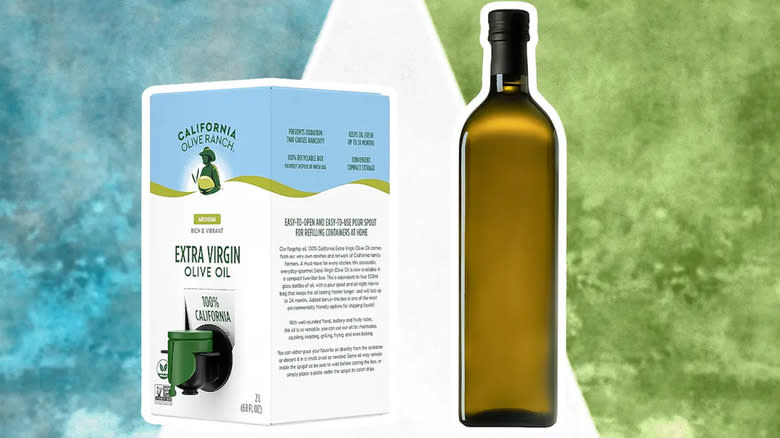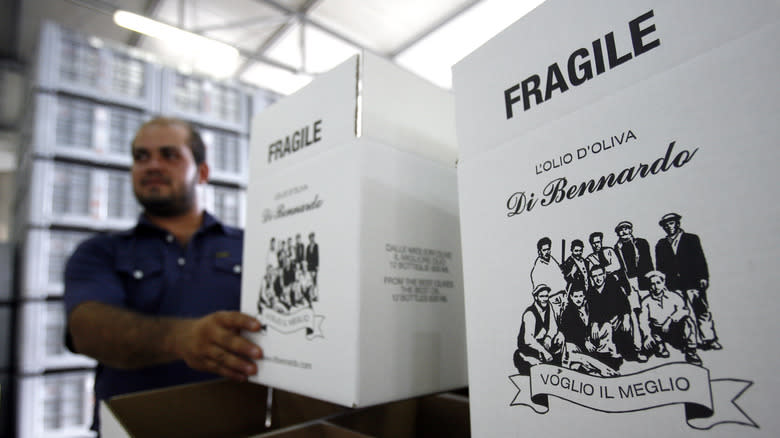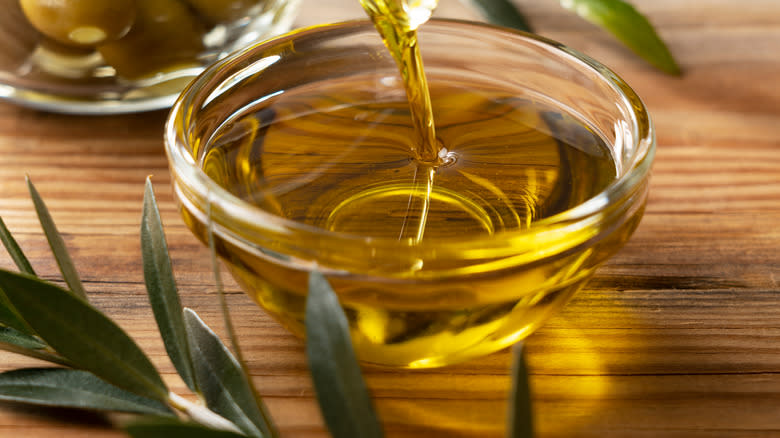The Pros And Cons Of Using Boxed Olive Oil Over Bottled

Boxed olive oil (also called "bag-in-box" olive oil) is quite rare to find on grocery stores shelves compared to the typical bottled kind. Despite its strange look, olive oil stored in boxes has some impressive benefits, such as a longer shelf life and a friendlier environmental footprint.
Boxing liquids is not a new concept: It's been around since the 1980s, with it first being offered for fruit juices and wine. Inside the cardboard box, there's a bag or tube which holds the olive oil. This connects to a tap, which dispenses the oil when opened. Besides holding a greater volume of olive oil, what's great about this setup is that the bag inside is airtight. Unlike the typical tinted glass bottles, which allow air to rush in when uncapped, the bag in the box collapses as you dispense the oil, keeping air infiltration minimal. Because of this, the oil doesn't oxidize and degrade as quickly, which makes boxed olive oil a great choice for those who like buying their cooking oil in bulk. In fact, a study from the University of Ioannina found that boxed olive oil retains its quality for over 120 days, compared to just 80 days in tin-plated steel containers.
And, because boxed olive oil is in a container made of cardboard, it's very lightweight. Manufacturers can ship a lot more olive oil per trip than with glass bottles. That not only saves money, but also reduces the carbon footprint of olive oil production and shipping.
Read more: The 20 Best Olive Oils For Cooking
The Reason Why Boxed Olive Oil Hasn't Caught Up To Glass Bottles

As amazing as boxed olive oil sounds, it's not a flawless design. One primary concern is the type of plastic used for the inner bag. These bags are often coated in a layer of metalized film to serve as an extra layer of protection for the oil against light and oxygen. However, the film makes the bag difficult to recycle, unlike glass bottles (fortunately, some manufacturers are developing recyclable inner bags, so this won't be a problem for much longer).
But perhaps a bigger reason why it hasn't caught on among consumers yet is simply a matter of perception. Just like with boxed wine, boxed olive oil is thought by most people to be cheap, inferior-quality oil, compared to oil that comes in glass bottles. It doesn't help that the box is shut tight, so you can't peer into the bag to see the oil yourself.
In defense of boxed olive oil, rest assured that there's nothing wrong with it. If you buy from a reputable brand, the oil within will still taste every bit as good as bottled oil that's in the same price and quality range, and comes with added benefits like longer shelf life. "Boxed is bad" is merely a myth!
A Few Storage Tips To Keep In Mind For Boxed Olive Oil

If you're thinking about trying boxed olive oil, here are some tips to ensure it stays fresh and tasty. First, even though the packaging already does a solid job of protecting the oil from light and oxidation, you'll still want to find a cool, dry spot with a steady temperature to store your boxed olive oil. This spot should ideally have a temperature of around 64 to 68 degrees Fahrenheit. It's also a good idea to give the spout a wipe-down every few days with a damp cloth, in order to prevent residual olive oil from building up and attracting bacteria.
Lastly, don't forget to mark the date of when you first opened the box with a marker. This simple step will help you keep track of when it's time to switch to a new box of olive oil. Per the University of Ioannina study, it's best to use up your boxed olive oil within 120 days to get the most flavor. While the oil can definitely be used for a while longer (watch the harvest or best-by dates), you may risk losing optimum flavor past this point.
Read the original article on Tasting Table.

 Yahoo Finance
Yahoo Finance 